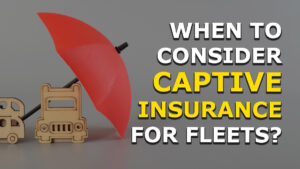Once you start getting paid, everything is golden, right? Well, this is where the real work begins.
As we mentioned in part one of our managing cashflow series, where we discussed managing cash inflow, running a trucking company requires a lot of attention to detail.
If anything falls through the cracks, your company could face costly issues. That is why managing cashflow is crucial for success.
The way you control positive cashflow is to speed up the inflow and reduce the cash outflow.
As a carrier, you can increase cash inflow by bringing in more money or speeding up when that money comes in. Four ways to do this are to charge more, use factoring or broker quickpay options, work with trusted shippers directly, and follow-up on invoices.
[Related: Trucking Start-up: How to Manage Cash Inflow]
To slow down cash outflow, we need to find ways to spend less or move the due dates for bills to a later date.
To achieve this, let’s look at factoring and quickpay options, how to use IFTA correctly, set-up fuel cards and tire or maintenance accounts, manage rate negotiations, and find other operation inefficiencies.
Use IFTA correctly
Typically, fuel is the largest operating costs in a trucking company and the average truck today can consume more than 20,000 gallons of fuel a year, costing more than $70,000.
In fact, due to record-high fuel prices and their roller-coaster swings in 2022, fuel prices became the top concern in trucking according to ATRI annual issues report.
Unfortunately, many carriers purchase fuel using the wrong strategy, leaving thousands of dollars on the table.
Why? Because each state sells fuel at a different price and taxes the fuel at its own rate.
On top of this, the International Fuel Tax Agreement (IFTA) requires that you pay taxes to each state (or Canadian province) that you drive through regardless of where you bought the fuel. Specifically, you must pay for the fuel consumed (and sometimes miles traveled) in their jurisdiction.
So, buying the “cheapest” pump price fuel does not guarantee the cheapest fuel.
Smart carriers develop a strategy to help optimize their fuel purchases. This concept is easier to explain with an example.
Let’s assume you have the option of buying fuel in Illinois or in Missouri. Here are the per-gallon pump prices from a few years ago:
- Illinois: $3.399
- Missouri: $3.259
Where would you buy your fuel? At first glance, Missouri has the cheaper fuel. Seems like the obvious choice, right? Let’s look at the same numbers, but with more details:
- Illinois: $3.399 ($2.972 pre-tax + $0.427 tax)
- Missouri: $3.259 ($3.089 pre-tax + $0.170 tax)
Although Missouri has the cheaper pump price, Illinois has the cheaper pre-tax price. Illinois is the better deal because you are paying a lower BASE PRICE for the fuel. Then, using your IFTA calculations, you can add the relevant taxes later, as required.
The numbers add up when you drive thousands of miles every month.
Using this strategy, you could rack up huge savings that simply drop to your bottom line as profit.
Utilize fuel cards and tires or maintenance accounts
Fuel Cards
Fuel cards are payment cards that can help you get discounts on your diesel purchases from a network of fuel stations, which will help you maintain cashflow.
These cards function like a credit card, where you can make the necessary fuel purchase through the card and get an extra 60-90 days to come up with the cash to repay the bill.
Based on price point, fuel cards are placed in two categories:
- Fixed-price fuel cards
- Pump price fuel cards
In fixed-price fuel cards, the fuel rate is determined for the whole week. And you are informed a week ahead. So, if you expect a rise in fuel prices in the upcoming days, you can refill at lower prices.
On the other hand, with pump price fuel cards, you will be charged according to the price displayed on the pump.
Apart from fuels, few companies also allow you to buy additional items such as toll payments or similar expenses like lubricants, car washes, and more.
While a fuel card is the best way to optimize fuel expenses, not all fuel stations will accept your fuel card, and not all the fuel card companies give you the same discounts.
The best fuel card for your business depends on:
- location
- discounts
- type of vehicle
- and more.
Location
Some fuel cards will only work in a particular region or at certain fuel stations. If you are a local or small fleet operator that runs in a particular area, choosing a branded or fleet fuel card with a limited operating territory can be a cost-effective choice.
Discounts
Fuel card providers offer you different types of discounts, from point-of-sale and rebates.
Point-of-sale discounts reduced the fuel cost at the time of purchase. The company immediately provides the amount to the fuel card company, which reverts it to the fuel station.
On the other hand, in the rebate model, the fleet receives the fuel receipts for the total amount of fuel purchased at the end of the month.
Also, some trucking businesses use several fuel cards simultaneously, which is particularly helpful if they don’t cost anything and you want to maximize access to different stations. You should research routes and costs to determine if this makes sense for your business.
Tire and Maintenance Accounts
Like the fuel card, tire and maintenance accounts are credit accounts that defers payment of big expenses to pay them later. Most cards provide detailed monthly reports on transactions and let you set restrictions on purchases.
This eliminates the risk of your drivers fudging on their expense reports and costing your fleet more money.
Managing rate changes
Freight recessions come and go and the bull and bear cycles are vicious. In 2023, we are in a bear market with a chance of a recession hitting this summer.
If a shipper asks for a rate cut of 10-15%, instead of accepting it across your business, take a lane-by-lane approach to negotiation versus a unilateral cut.
On the flip side, just because a shipper is asking for a rate reduction, don’t be shy about asking for an increase if one is needed. Just note that a carrier might have to work with the shipper on a series of increases that get the rate where it needs to be.
Find inefficiencies in your operation
Efficiency is key to profitability and your trucking business makes money by optimizing efficiency.
It goes without saying that if your trucks spend days idling and wasting fuel, you won’t be profitable.
Your success is dependent on ensuring that you are maximizing your equipment utilization and generating the most revenue possible of your fixed expenses.
Look at any other inefficiencies you may have in your business as they could be costing you in the long run.
To find them analyze all your expenses. Ask yourself if the expenses are necessary and if there are cheaper solutions that can provide the same results.
Understanding your business expenses can help you become more efficient, operationally and financially.
Additionally, make sure you are limiting mistakes, especially with DOT violations that can cost you thousands, leave you out-of-service on the road, ruin business relationships, and increase future insurance rates.
How can you find the best commercial truck insurance rates?
Allow a CNS Insurance Commercial Trucking Insurance Specialist to pull multiple insurance quotes for you to find the best rates.
It never hurts to get a quote and try saving money on your insurance premiums.
Give us a call anytime and we can discuss lowering your premiums or getting a quote to see where you stand.
Before we can get you an estimate, we are going to need some information.
Fill out a complete quote or quick quote to get started.
If you have any questions or concerns, please call us at 800.724.5523 or email info@cnsinsures.com.






